Module 10 The weather Unit 1 It might snow.教案
文档属性
| 名称 | Module 10 The weather Unit 1 It might snow.教案 |
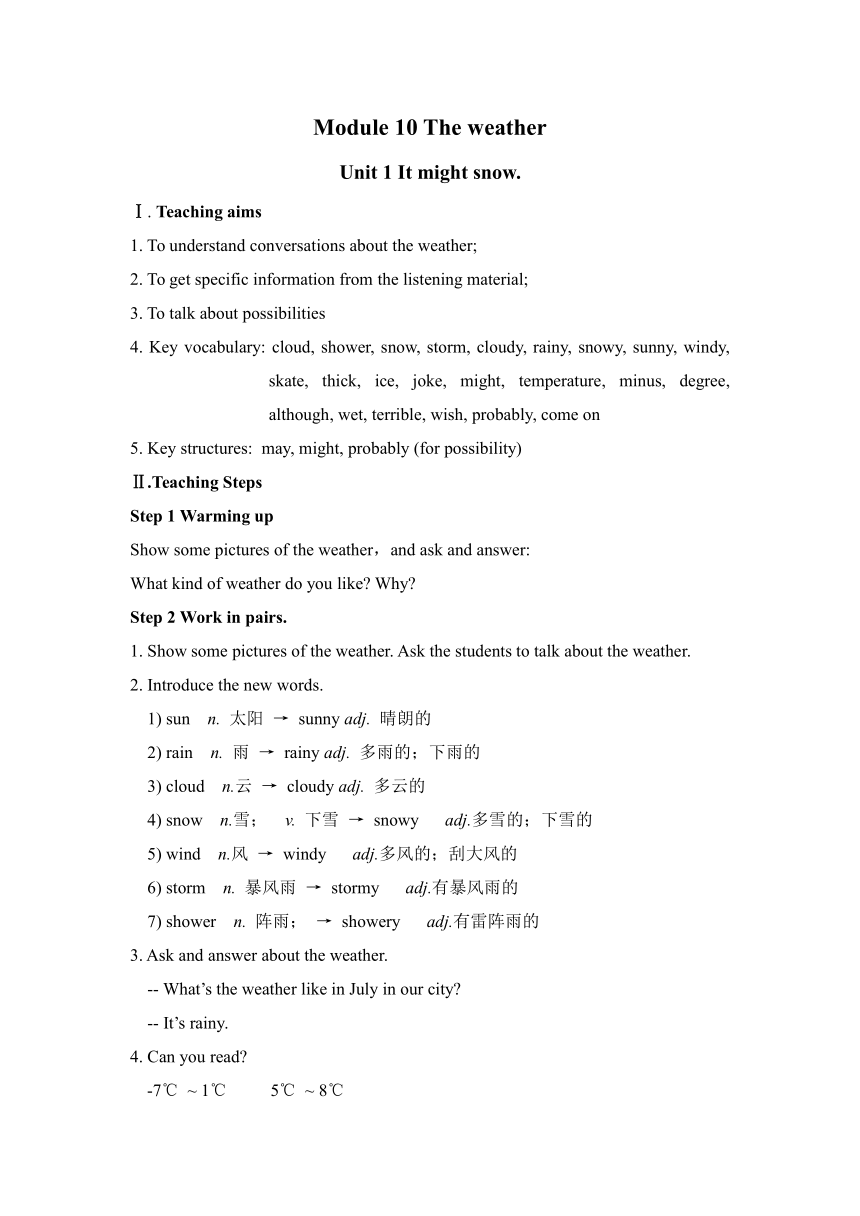
|
|
| 格式 | docx | ||
| 文件大小 | 90.3KB | ||
| 资源类型 | 教案 | ||
| 版本资源 | 外研版 | ||
| 科目 | 英语 | ||
| 更新时间 | 2024-08-15 00:00:00 | ||
图片预览

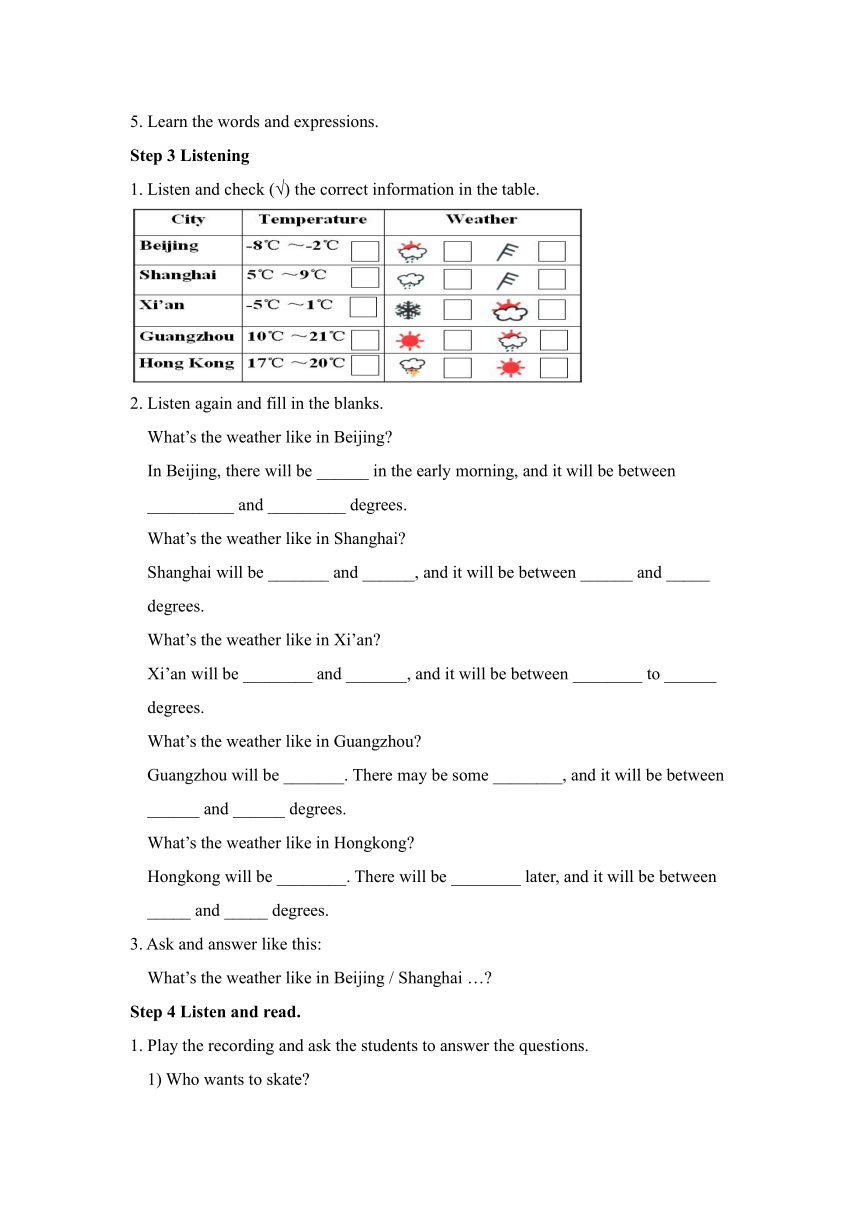
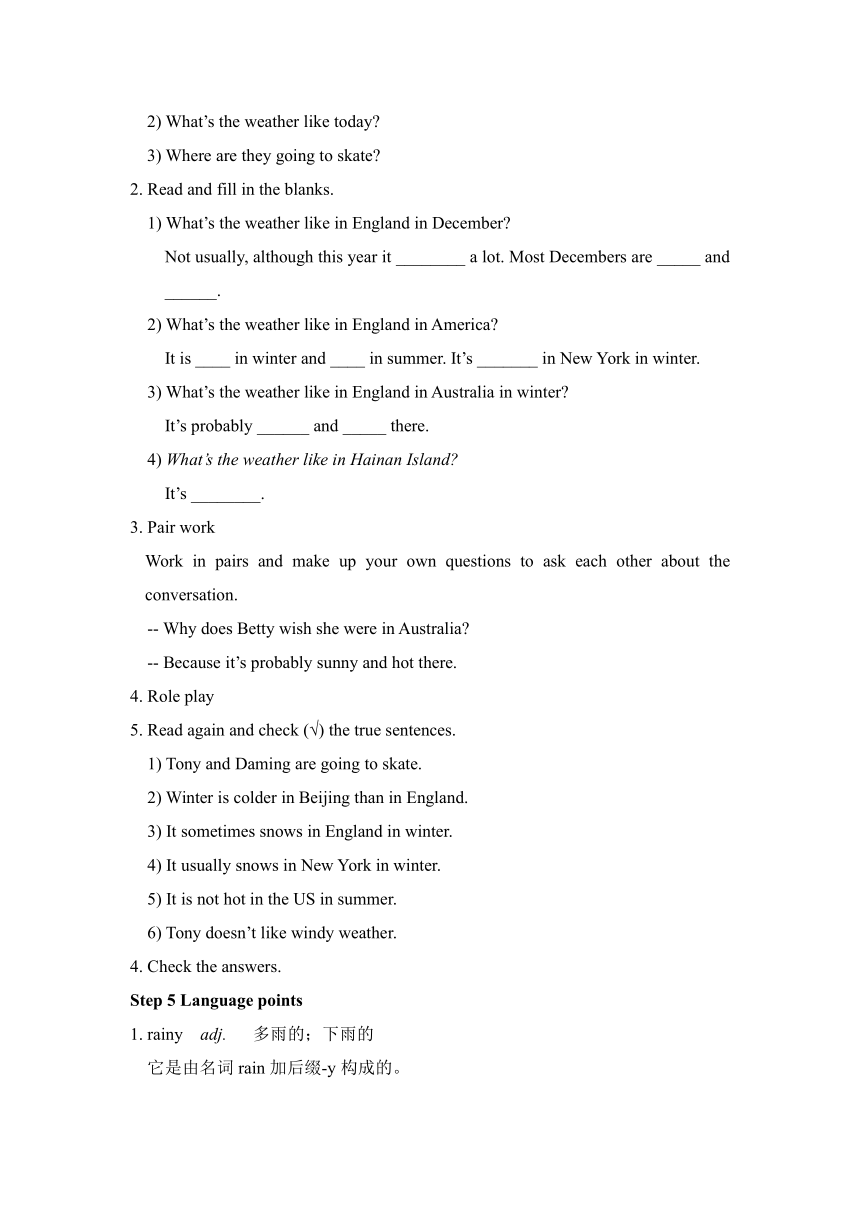
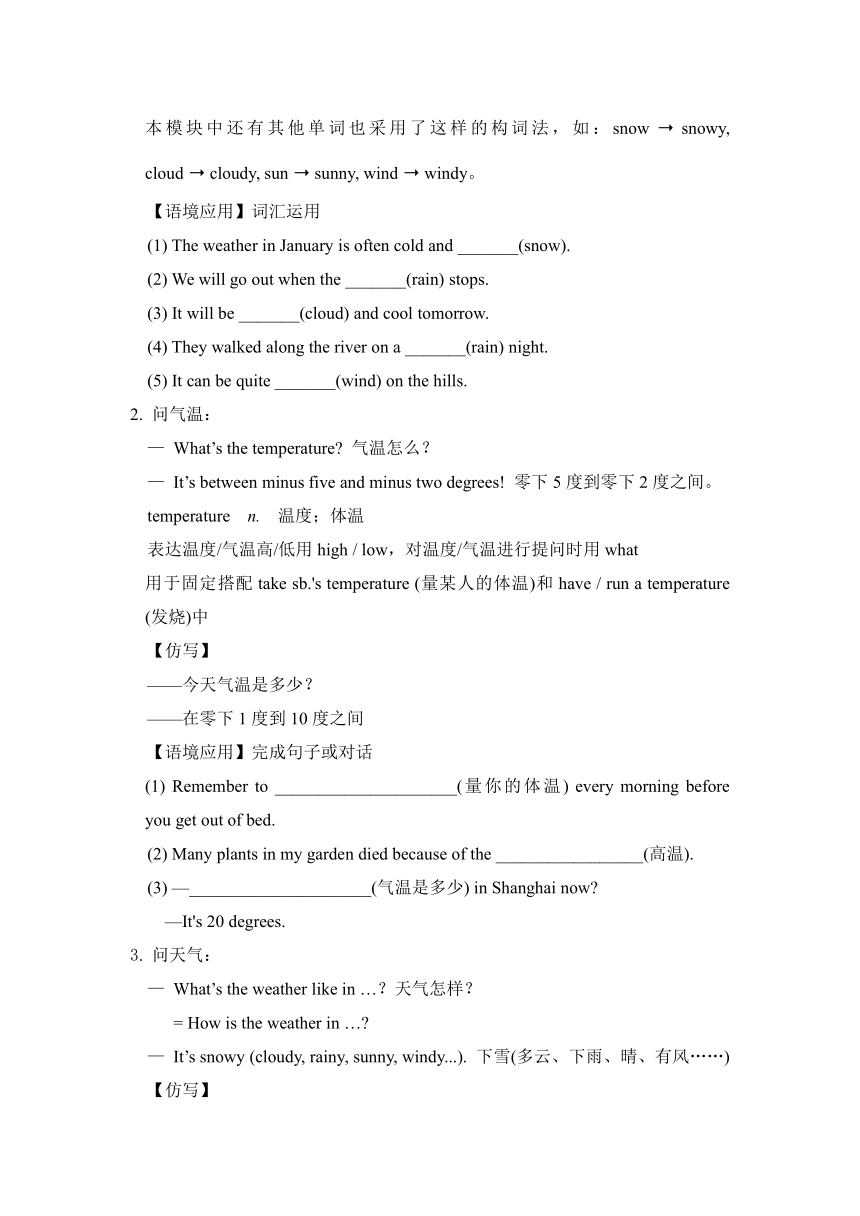
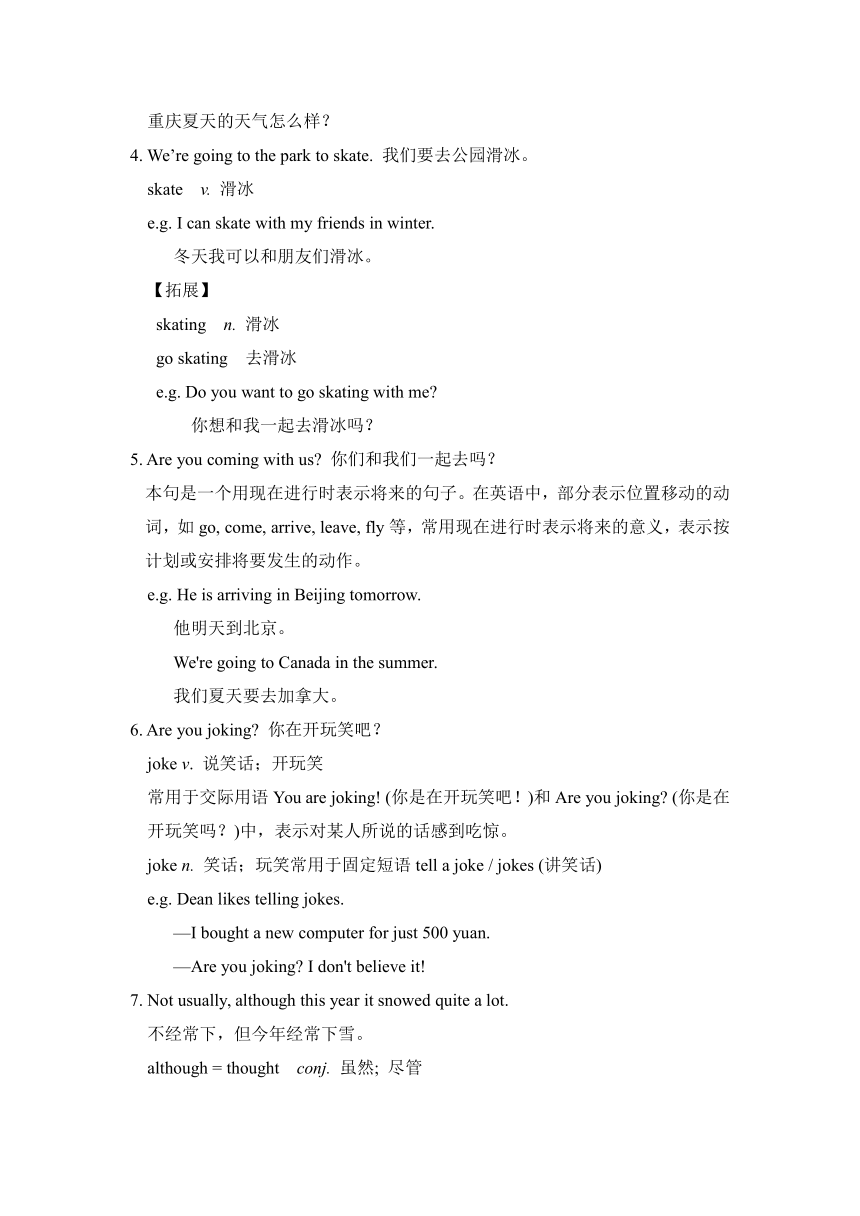
文档简介
Module 10 The weather
Unit 1 It might snow.
Ⅰ. Teaching aims
1. To understand conversations about the weather;
2. To get specific information from the listening material;
3. To talk about possibilities
4. Key vocabulary: cloud, shower, snow, storm, cloudy, rainy, snowy, sunny, windy, skate, thick, ice, joke, might, temperature, minus, degree, although, wet, terrible, wish, probably, come on
5. Key structures: may, might, probably (for possibility)
Ⅱ.Teaching Steps
Step 1 Warming up
Show some pictures of the weather,and ask and answer:
What kind of weather do you like Why
Step 2 Work in pairs.
1. Show some pictures of the weather. Ask the students to talk about the weather.
2. Introduce the new words.
1) sun n. 太阳 → sunny adj. 晴朗的
2) rain n. 雨 → rainy adj. 多雨的;下雨的
3) cloud n.云 → cloudy adj. 多云的
4) snow n.雪; v. 下雪 → snowy adj.多雪的;下雪的
5) wind n.风 → windy adj.多风的;刮大风的
6) storm n. 暴风雨 → stormy adj.有暴风雨的
7) shower n. 阵雨; → showery adj.有雷阵雨的
3. Ask and answer about the weather.
-- What’s the weather like in July in our city
-- It’s rainy.
4. Can you read
-7℃ ~ 1℃ 5℃ ~ 8℃
5. Learn the words and expressions.
Step 3 Listening
1. Listen and check (√) the correct information in the table.
2. Listen again and fill in the blanks.
What’s the weather like in Beijing
In Beijing, there will be ______ in the early morning, and it will be between __________ and _________ degrees.
What’s the weather like in Shanghai
Shanghai will be _______ and ______, and it will be between ______ and _____ degrees.
What’s the weather like in Xi’an
Xi’an will be ________ and _______, and it will be between ________ to ______ degrees.
What’s the weather like in Guangzhou
Guangzhou will be _______. There may be some ________, and it will be between ______ and ______ degrees.
What’s the weather like in Hongkong
Hongkong will be ________. There will be ________ later, and it will be between _____ and _____ degrees.
3. Ask and answer like this:
What’s the weather like in Beijing / Shanghai …
Step 4 Listen and read.
1. Play the recording and ask the students to answer the questions.
1) Who wants to skate
2) What’s the weather like today
3) Where are they going to skate
2. Read and fill in the blanks.
1) What’s the weather like in England in December
Not usually, although this year it ________ a lot. Most Decembers are _____ and ______.
2) What’s the weather like in England in America
It is ____ in winter and ____ in summer. It’s _______ in New York in winter.
3) What’s the weather like in England in Australia in winter
It’s probably ______ and _____ there.
4) What’s the weather like in Hainan Island
It’s ________.
3. Pair work
Work in pairs and make up your own questions to ask each other about the conversation.
-- Why does Betty wish she were in Australia
-- Because it’s probably sunny and hot there.
4. Role play
5. Read again and check (√) the true sentences.
1) Tony and Daming are going to skate.
2) Winter is colder in Beijing than in England.
3) It sometimes snows in England in winter.
4) It usually snows in New York in winter.
5) It is not hot in the US in summer.
6) Tony doesn’t like windy weather.
4. Check the answers.
Step 5 Language points
1. rainy adj. 多雨的;下雨的
它是由名词rain加后缀-y构成的。
本模块中还有其他单词也采用了这样的构词法,如:snow snowy, cloud cloudy, sun sunny, wind windy。
【语境应用】词汇运用
(1) The weather in January is often cold and _______(snow).
(2) We will go out when the _______(rain) stops.
(3) It will be _______(cloud) and cool tomorrow.
(4) They walked along the river on a _______(rain) night.
(5) It can be quite _______(wind) on the hills.
2. 问气温:
— What’s the temperature 气温怎么?
— It’s between minus five and minus two degrees! 零下5度到零下2度之间。
temperature n. 温度;体温
表达温度/气温高/低用high / low,对温度/气温进行提问时用what
用于固定搭配take sb.'s temperature (量某人的体温)和have / run a temperature (发烧)中
【仿写】
——今天气温是多少?
——在零下1度到10度之间
【语境应用】完成句子或对话
(1) Remember to _____________________(量你的体温) every morning before you get out of bed.
(2) Many plants in my garden died because of the _________________(高温).
(3) —_____________________(气温是多少) in Shanghai now
—It's 20 degrees.
3. 问天气:
— What’s the weather like in …?天气怎样?
= How is the weather in …
— It’s snowy (cloudy, rainy, sunny, windy...). 下雪(多云、下雨、晴、有风……)
【仿写】
重庆夏天的天气怎么样?
4. We’re going to the park to skate. 我们要去公园滑冰。
skate v. 滑冰
e.g. I can skate with my friends in winter.
冬天我可以和朋友们滑冰。
【拓展】
skating n. 滑冰
go skating 去滑冰
e.g. Do you want to go skating with me
你想和我一起去滑冰吗?
5. Are you coming with us 你们和我们一起去吗?
本句是一个用现在进行时表示将来的句子。在英语中,部分表示位置移动的动词,如go, come, arrive, leave, fly等,常用现在进行时表示将来的意义,表示按计划或安排将要发生的动作。
e.g. He is arriving in Beijing tomorrow.
他明天到北京。
We're going to Canada in the summer.
我们夏天要去加拿大。
6. Are you joking 你在开玩笑吧?
joke v. 说笑话;开玩笑
常用于交际用语You are joking! (你是在开玩笑吧!)和Are you joking (你是在开玩笑吗?)中,表示对某人所说的话感到吃惊。
joke n. 笑话;玩笑常用于固定短语tell a joke / jokes (讲笑话)
e.g. Dean likes telling jokes.
—I bought a new computer for just 500 yuan.
—Are you joking I don't believe it!
7. Not usually, although this year it snowed quite a lot.
不经常下,但今年经常下雪。
although = thought conj. 虽然; 尽管
引导的让步状语从句,既可放在主句之前,也可放在主句之后。不能与but, however连用。
e.g. Although/Though he was tired, he continued working.
虽然他很累,但他一直在工作。
He often helps me with my English although/though he is quite busy.
尽管他很忙,但是还常常帮我学英语。
单项选择。
1) ________ I have lost everything in this terrible earthquake, I have not lost my life.
A. Because B. So C. Although D. If
2) ________ the girl is only six years old, she knows more than 300 ancient Chinese poems.
A. If B. Unless C. Although
8. Me neither.
Me neither意为“我也不”,用于后一句的情况与前一句所述的否定情况相同的场合。
【链接】
Me too意为“我也一样,我也如此”,用于后一句的情况与前一句所述的肯定情况相同的场合。
1) — 贝蒂上周没去那个舞会。
— 我也没有去。
— Betty didn’t go to that dance party last week.
— ________________.
2) — 比尔喜欢秋天。
— 我也一样。
— Bill likes autumn.
— ________________.
9. Rainy weather is terrible!
下雨天是挺讨厌的!
terrible adj. 可怕的,恐怖的
指某事物给人恐怖的感觉,但在日常英语里,它通常用来表示事情很糟糕、很差
e.g. They are having a terrible time.
他们的日子过得很糟糕。
10. I wish I were in Australia now.
wish可用作动词,意为“愿意;希望”,常用结构为:
(1) wish + (that)从句,希望……;但愿……
wish后面接宾语从句,从句中要使用虚拟语气,表示一种无法实现或不真实的愿望。从句的谓语动词用过去式,be动词通常用were。
e.g. I wish I were in America now.
真希望我现在美国。
(2) wish to do sth.表示“希望做某事;想做某事”。如:
I wish to go on a trip to Beijing.
(3) wish sb. / sth.+ adj.表示“希望某人 / 某物如何”。如:
I wish you healthy.
(4) wish sb. + n. 表示“祝愿某人如何”。如:
I wish you a long life.
【仿写】我希望我像姚明一样高。
根据汉语意思完成英语句子,每空一词。
1) 他们祝我们好运。
They _____ us ____ _____.
2) 我希望待在这里。
I ____ __ ____ here.
3) 祝你快乐。
I _____ you _______.
11. It’s probably sunny and hot there. 那里的天气可能晴朗、热。
probably adv. 大概;或许;很可能
英语中表示可能的方式有:
通过will以及表示“可能”的形容词和副词表达, 常用的有:
It is possible to do sth. .., It is possible that …, 主语 + will probably / possibly + v.等。如:
Is it possible to visit Alaska in December 十二月去阿拉斯加游览有可能吗?
It is possible that it’ll be snowy in the night. 晚上有可能会下雪。
It’ll probably be cold and wet天气很可能会又湿又冷。
probably 表示“很可能”,所以表示的可能性要比possible 大。
12. Come on, better get going! 好了,走吧!
Better get going 相当于had better go now, 意思是“最好现在去/ 走”。如:
We’d better get going (= We’d better go now ) , or we’ll be late.
我们最好现在就走,不然要迟到了。
Step 6 Complete the passage.
1. Ask the students to complete the passage with the words in the box.
dangerous degree joke may minus skate temperature
When it’s very cold, it might be safe to (1) ____________ on lakes, but be very careful! Although it (2) ___________ feel cold, it might not be safe. The (3) ___________ has to be at least (4) ___________ one or two (5) ___________ or even lower for several weeks, and the ice will be thick enough. Falling through the ice is (6) _____________. I’m not (7) ____________!
2. Check the answers.
Step 7 Pronunciation and speaking
1. Play the recording once without stopping.
2. Play the recording again and ask the whole class to repeat.
3. Listen to the speaker asking a question.
What’s the weather like
4. Now listen to the speaker showing surprise.
What’s the weather like
5. 不同的语调可以表达不同的态度、感情和情绪。同样一句话在不同的场合, 要用不同的语调。一般而言,特殊疑问句要用降调,如果要表达某种态度、感情和情绪,也可以使用升调。
6. Listen and write * if the speaker is asking a question or ** if he is showing surprise.
1) When is the best time to visit your country
2) What clothes should she bring
3) What’s the temperature
4) Where are you going
7. Now listen again and repeat.
Step 8 Work in pairs.
1. Talk about the weather.
2. Look at the correct information in the table in Activity 2. Give the correct weather forecast for China.
3. Now say what the weather might or might not be like.
Tomorrow next week next month
It’ll probably be cold tomorrow.
Step 9 Summary
Some important expressions in this unit.
1. 快点
2. 有时;间或
3. 在湖面上
4. ……和……之间
5. 非常多
6. 晴朗的天气
7. 也
8. 总有一天
9. 变暖和
Step 10 Exercises
Ⅰ. 根据语境,用括号内所给单词的适当形式填空。
1. If you're free tomorrow, we can go _______(skate) together.
2. The weather in Suzhou is _______(wet) than that in Beijing.
3. My American pen friend _______(wish) to visit China one day.
4. I don't like _______(rain) weather. I hope the sun will come out soon.
5. My sweater is much _______(thick) than yours.
Ⅱ. 根据语境及所给汉语提示语写出所缺单词。
1. Mary is your sister You're _______(开玩笑)!
2. Bill saw a(n) _______(可怕的) accident on his way to school this morning.
3. _______(尽管) you didn't win this time, you can have a second try.
4. There will be many _______(暴风雨) over most of the area tomorrow.
5. The temperature now is minus two _______(度).
6. Mr King didn't drive to work yesterday because it _______(下雪) heavily.
Ⅲ. 根据汉语意思完成英语句子或对话,每空一词(含缩略形式)。
1. ——我明天不去参加Kevin的派对。
——我也不去。
—I won't go to Kevin's party tomorrow.
—_______ _______.
2. 快点!我们没有多少时间了!
_______ _______! We don't have much time left!
3. 如果你需要帮助,你可以给我打电话。
_______ _______ call me _______ _______ need help.
4. 当春天来临时,天气会变暖和。
The weather will _______ _______ when spring comes.
5. 夏天我们经常在湖上划船。
We often go boating _______ _______ _______ in summer.
6. Mason喜欢篮球,也喜欢乒乓球。
Mason loves basketball, and he loves table tennis _______ _______.
7. ——你家乡夏天的天气怎么样?
——通常又炎热又干燥。
—_______ _______ _______ _______ in your home town in summer
—It's usually hot and dry.
8. 读书可以在我们的生活和多彩的世界间架起一座桥梁。
Reading books can build a bridge _______ our lives _______ the colourful world.
Step 11 Homework
What’s the weather like in your place in summer and winter Write several sentences about it.
Unit 1 It might snow.
Ⅰ. Teaching aims
1. To understand conversations about the weather;
2. To get specific information from the listening material;
3. To talk about possibilities
4. Key vocabulary: cloud, shower, snow, storm, cloudy, rainy, snowy, sunny, windy, skate, thick, ice, joke, might, temperature, minus, degree, although, wet, terrible, wish, probably, come on
5. Key structures: may, might, probably (for possibility)
Ⅱ.Teaching Steps
Step 1 Warming up
Show some pictures of the weather,and ask and answer:
What kind of weather do you like Why
Step 2 Work in pairs.
1. Show some pictures of the weather. Ask the students to talk about the weather.
2. Introduce the new words.
1) sun n. 太阳 → sunny adj. 晴朗的
2) rain n. 雨 → rainy adj. 多雨的;下雨的
3) cloud n.云 → cloudy adj. 多云的
4) snow n.雪; v. 下雪 → snowy adj.多雪的;下雪的
5) wind n.风 → windy adj.多风的;刮大风的
6) storm n. 暴风雨 → stormy adj.有暴风雨的
7) shower n. 阵雨; → showery adj.有雷阵雨的
3. Ask and answer about the weather.
-- What’s the weather like in July in our city
-- It’s rainy.
4. Can you read
-7℃ ~ 1℃ 5℃ ~ 8℃
5. Learn the words and expressions.
Step 3 Listening
1. Listen and check (√) the correct information in the table.
2. Listen again and fill in the blanks.
What’s the weather like in Beijing
In Beijing, there will be ______ in the early morning, and it will be between __________ and _________ degrees.
What’s the weather like in Shanghai
Shanghai will be _______ and ______, and it will be between ______ and _____ degrees.
What’s the weather like in Xi’an
Xi’an will be ________ and _______, and it will be between ________ to ______ degrees.
What’s the weather like in Guangzhou
Guangzhou will be _______. There may be some ________, and it will be between ______ and ______ degrees.
What’s the weather like in Hongkong
Hongkong will be ________. There will be ________ later, and it will be between _____ and _____ degrees.
3. Ask and answer like this:
What’s the weather like in Beijing / Shanghai …
Step 4 Listen and read.
1. Play the recording and ask the students to answer the questions.
1) Who wants to skate
2) What’s the weather like today
3) Where are they going to skate
2. Read and fill in the blanks.
1) What’s the weather like in England in December
Not usually, although this year it ________ a lot. Most Decembers are _____ and ______.
2) What’s the weather like in England in America
It is ____ in winter and ____ in summer. It’s _______ in New York in winter.
3) What’s the weather like in England in Australia in winter
It’s probably ______ and _____ there.
4) What’s the weather like in Hainan Island
It’s ________.
3. Pair work
Work in pairs and make up your own questions to ask each other about the conversation.
-- Why does Betty wish she were in Australia
-- Because it’s probably sunny and hot there.
4. Role play
5. Read again and check (√) the true sentences.
1) Tony and Daming are going to skate.
2) Winter is colder in Beijing than in England.
3) It sometimes snows in England in winter.
4) It usually snows in New York in winter.
5) It is not hot in the US in summer.
6) Tony doesn’t like windy weather.
4. Check the answers.
Step 5 Language points
1. rainy adj. 多雨的;下雨的
它是由名词rain加后缀-y构成的。
本模块中还有其他单词也采用了这样的构词法,如:snow snowy, cloud cloudy, sun sunny, wind windy。
【语境应用】词汇运用
(1) The weather in January is often cold and _______(snow).
(2) We will go out when the _______(rain) stops.
(3) It will be _______(cloud) and cool tomorrow.
(4) They walked along the river on a _______(rain) night.
(5) It can be quite _______(wind) on the hills.
2. 问气温:
— What’s the temperature 气温怎么?
— It’s between minus five and minus two degrees! 零下5度到零下2度之间。
temperature n. 温度;体温
表达温度/气温高/低用high / low,对温度/气温进行提问时用what
用于固定搭配take sb.'s temperature (量某人的体温)和have / run a temperature (发烧)中
【仿写】
——今天气温是多少?
——在零下1度到10度之间
【语境应用】完成句子或对话
(1) Remember to _____________________(量你的体温) every morning before you get out of bed.
(2) Many plants in my garden died because of the _________________(高温).
(3) —_____________________(气温是多少) in Shanghai now
—It's 20 degrees.
3. 问天气:
— What’s the weather like in …?天气怎样?
= How is the weather in …
— It’s snowy (cloudy, rainy, sunny, windy...). 下雪(多云、下雨、晴、有风……)
【仿写】
重庆夏天的天气怎么样?
4. We’re going to the park to skate. 我们要去公园滑冰。
skate v. 滑冰
e.g. I can skate with my friends in winter.
冬天我可以和朋友们滑冰。
【拓展】
skating n. 滑冰
go skating 去滑冰
e.g. Do you want to go skating with me
你想和我一起去滑冰吗?
5. Are you coming with us 你们和我们一起去吗?
本句是一个用现在进行时表示将来的句子。在英语中,部分表示位置移动的动词,如go, come, arrive, leave, fly等,常用现在进行时表示将来的意义,表示按计划或安排将要发生的动作。
e.g. He is arriving in Beijing tomorrow.
他明天到北京。
We're going to Canada in the summer.
我们夏天要去加拿大。
6. Are you joking 你在开玩笑吧?
joke v. 说笑话;开玩笑
常用于交际用语You are joking! (你是在开玩笑吧!)和Are you joking (你是在开玩笑吗?)中,表示对某人所说的话感到吃惊。
joke n. 笑话;玩笑常用于固定短语tell a joke / jokes (讲笑话)
e.g. Dean likes telling jokes.
—I bought a new computer for just 500 yuan.
—Are you joking I don't believe it!
7. Not usually, although this year it snowed quite a lot.
不经常下,但今年经常下雪。
although = thought conj. 虽然; 尽管
引导的让步状语从句,既可放在主句之前,也可放在主句之后。不能与but, however连用。
e.g. Although/Though he was tired, he continued working.
虽然他很累,但他一直在工作。
He often helps me with my English although/though he is quite busy.
尽管他很忙,但是还常常帮我学英语。
单项选择。
1) ________ I have lost everything in this terrible earthquake, I have not lost my life.
A. Because B. So C. Although D. If
2) ________ the girl is only six years old, she knows more than 300 ancient Chinese poems.
A. If B. Unless C. Although
8. Me neither.
Me neither意为“我也不”,用于后一句的情况与前一句所述的否定情况相同的场合。
【链接】
Me too意为“我也一样,我也如此”,用于后一句的情况与前一句所述的肯定情况相同的场合。
1) — 贝蒂上周没去那个舞会。
— 我也没有去。
— Betty didn’t go to that dance party last week.
— ________________.
2) — 比尔喜欢秋天。
— 我也一样。
— Bill likes autumn.
— ________________.
9. Rainy weather is terrible!
下雨天是挺讨厌的!
terrible adj. 可怕的,恐怖的
指某事物给人恐怖的感觉,但在日常英语里,它通常用来表示事情很糟糕、很差
e.g. They are having a terrible time.
他们的日子过得很糟糕。
10. I wish I were in Australia now.
wish可用作动词,意为“愿意;希望”,常用结构为:
(1) wish + (that)从句,希望……;但愿……
wish后面接宾语从句,从句中要使用虚拟语气,表示一种无法实现或不真实的愿望。从句的谓语动词用过去式,be动词通常用were。
e.g. I wish I were in America now.
真希望我现在美国。
(2) wish to do sth.表示“希望做某事;想做某事”。如:
I wish to go on a trip to Beijing.
(3) wish sb. / sth.+ adj.表示“希望某人 / 某物如何”。如:
I wish you healthy.
(4) wish sb. + n. 表示“祝愿某人如何”。如:
I wish you a long life.
【仿写】我希望我像姚明一样高。
根据汉语意思完成英语句子,每空一词。
1) 他们祝我们好运。
They _____ us ____ _____.
2) 我希望待在这里。
I ____ __ ____ here.
3) 祝你快乐。
I _____ you _______.
11. It’s probably sunny and hot there. 那里的天气可能晴朗、热。
probably adv. 大概;或许;很可能
英语中表示可能的方式有:
通过will以及表示“可能”的形容词和副词表达, 常用的有:
It is possible to do sth. .., It is possible that …, 主语 + will probably / possibly + v.等。如:
Is it possible to visit Alaska in December 十二月去阿拉斯加游览有可能吗?
It is possible that it’ll be snowy in the night. 晚上有可能会下雪。
It’ll probably be cold and wet天气很可能会又湿又冷。
probably 表示“很可能”,所以表示的可能性要比possible 大。
12. Come on, better get going! 好了,走吧!
Better get going 相当于had better go now, 意思是“最好现在去/ 走”。如:
We’d better get going (= We’d better go now ) , or we’ll be late.
我们最好现在就走,不然要迟到了。
Step 6 Complete the passage.
1. Ask the students to complete the passage with the words in the box.
dangerous degree joke may minus skate temperature
When it’s very cold, it might be safe to (1) ____________ on lakes, but be very careful! Although it (2) ___________ feel cold, it might not be safe. The (3) ___________ has to be at least (4) ___________ one or two (5) ___________ or even lower for several weeks, and the ice will be thick enough. Falling through the ice is (6) _____________. I’m not (7) ____________!
2. Check the answers.
Step 7 Pronunciation and speaking
1. Play the recording once without stopping.
2. Play the recording again and ask the whole class to repeat.
3. Listen to the speaker asking a question.
What’s the weather like
4. Now listen to the speaker showing surprise.
What’s the weather like
5. 不同的语调可以表达不同的态度、感情和情绪。同样一句话在不同的场合, 要用不同的语调。一般而言,特殊疑问句要用降调,如果要表达某种态度、感情和情绪,也可以使用升调。
6. Listen and write * if the speaker is asking a question or ** if he is showing surprise.
1) When is the best time to visit your country
2) What clothes should she bring
3) What’s the temperature
4) Where are you going
7. Now listen again and repeat.
Step 8 Work in pairs.
1. Talk about the weather.
2. Look at the correct information in the table in Activity 2. Give the correct weather forecast for China.
3. Now say what the weather might or might not be like.
Tomorrow next week next month
It’ll probably be cold tomorrow.
Step 9 Summary
Some important expressions in this unit.
1. 快点
2. 有时;间或
3. 在湖面上
4. ……和……之间
5. 非常多
6. 晴朗的天气
7. 也
8. 总有一天
9. 变暖和
Step 10 Exercises
Ⅰ. 根据语境,用括号内所给单词的适当形式填空。
1. If you're free tomorrow, we can go _______(skate) together.
2. The weather in Suzhou is _______(wet) than that in Beijing.
3. My American pen friend _______(wish) to visit China one day.
4. I don't like _______(rain) weather. I hope the sun will come out soon.
5. My sweater is much _______(thick) than yours.
Ⅱ. 根据语境及所给汉语提示语写出所缺单词。
1. Mary is your sister You're _______(开玩笑)!
2. Bill saw a(n) _______(可怕的) accident on his way to school this morning.
3. _______(尽管) you didn't win this time, you can have a second try.
4. There will be many _______(暴风雨) over most of the area tomorrow.
5. The temperature now is minus two _______(度).
6. Mr King didn't drive to work yesterday because it _______(下雪) heavily.
Ⅲ. 根据汉语意思完成英语句子或对话,每空一词(含缩略形式)。
1. ——我明天不去参加Kevin的派对。
——我也不去。
—I won't go to Kevin's party tomorrow.
—_______ _______.
2. 快点!我们没有多少时间了!
_______ _______! We don't have much time left!
3. 如果你需要帮助,你可以给我打电话。
_______ _______ call me _______ _______ need help.
4. 当春天来临时,天气会变暖和。
The weather will _______ _______ when spring comes.
5. 夏天我们经常在湖上划船。
We often go boating _______ _______ _______ in summer.
6. Mason喜欢篮球,也喜欢乒乓球。
Mason loves basketball, and he loves table tennis _______ _______.
7. ——你家乡夏天的天气怎么样?
——通常又炎热又干燥。
—_______ _______ _______ _______ in your home town in summer
—It's usually hot and dry.
8. 读书可以在我们的生活和多彩的世界间架起一座桥梁。
Reading books can build a bridge _______ our lives _______ the colourful world.
Step 11 Homework
What’s the weather like in your place in summer and winter Write several sentences about it.
同课章节目录
- Module 1 How to learn English
- Unit 1 Let's try to speak English as much as possi
- Unit 2 You should smile at her.
- Unit 3 Language in use .
- Module 2 My home town and my country
- Unit 1 It's taller than many other buildings.
- Unit 2 Cambridge is a beautiful city in the east o
- Unit 3 Language in use .
- Module 3 Sports.
- Unit 1 Nothing is more exciting than playing tenni
- Unit 2 This year we training more carefully.
- Unit 3 Language in use .
- Module 4 Planes, ships and trains .
- Unit 1 He lives the farthest from school.
- Unit 2 What is the best way to travel.
- Unit 3 Language in use .
- Module 5 Lao She Teahouse.
- Unit 1 I wanted to see the Beijing Opera.
- Unit 2 It descibes the changes in Chinese society.
- Unit 3 Language in use .
- Module 6 Animals in danger.
- Unit 1 It allows people to get closer to them .
- Unit 2 The WWF is working hard to save them all.
- Unit 3 Language in use .
- Revision module A
- Module 7 A famous story
- Unit 1 Alice was sitting with her sister by the ri
- Unit 2 She was thinking about her cat.
- Unit 3 Language in use .
- Module 8 Accidents
- Unit 1 While the car were changing to red, a car s
- Unit 2 I was trying to pick it up when it bite me
- Unit 3 Language in use .
- Module 9 Population
- Unit 1 The population of China is about 1.37 billi
- Unit 2 Arnwick was a city with 200,000 people.
- Unit 3 Language in use .
- Module 10 The weathe
- Unit 1 It might snow.
- Unit 2 The weather is fine all year round.
- Unit 3 Language in use .
- Module 11 Way of life
- Unit 1 In China ,we open a gift later.
- Unit 2 In England, you usually drink tea with milk
- Unit 3 Language in use .
- Module 12 Help
- Unit 1 What should we do before help arrives?
- Unit 2 Stay away from windows and heavy furniture.
- Unit 3 Language in use .
- Revision module B
